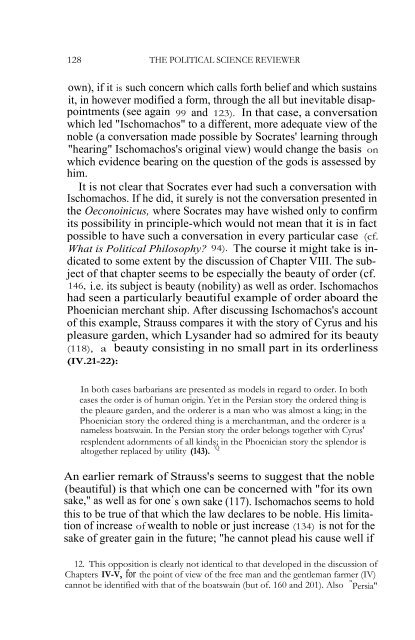Strauss on Xenophon's Socrates Xenophon's Socratic Discourse: An ...
Strauss on Xenophon's Socrates Xenophon's Socratic Discourse: An ...
Strauss on Xenophon's Socrates Xenophon's Socratic Discourse: An ...
Create successful ePaper yourself
Turn your PDF publications into a flip-book with our unique Google optimized e-Paper software.
128 THE POLITICAL SCIENCE REVIEWER<br />
own), if it is such c<strong>on</strong>cern which calls forth belief and which sustains<br />
it, in however modified a form, through the all but inevitable disappointments<br />
(see again 99 and 123). In that case, a c<strong>on</strong>versati<strong>on</strong><br />
which led "Ischomachos" to a different, more adequate view of the<br />
noble (a c<strong>on</strong>versati<strong>on</strong> made possible by <strong>Socrates</strong>' learning through<br />
"hearing" Ischomachos's original view) would change the basis <strong>on</strong><br />
which evidence bearing <strong>on</strong> the questi<strong>on</strong> of the gods is assessed by<br />
him.<br />
It is not clear that <strong>Socrates</strong> ever had such a c<strong>on</strong>versati<strong>on</strong> with<br />
Ischomachos. If he did, it surely is not the c<strong>on</strong>versati<strong>on</strong> presented in<br />
the Oec<strong>on</strong>oinicus, where <strong>Socrates</strong> may have wished <strong>on</strong>ly to c<strong>on</strong>firm<br />
its possibility in principle-which would not mean that it is in fact<br />
possible to have such a c<strong>on</strong>versati<strong>on</strong> in every particular case (cf.<br />
What is Political Philosophy? 94). The course it might take is indicated<br />
to some extent by the discussi<strong>on</strong> of Chapter VIII. The subject<br />
of that chapter seems to be especially the beauty of order (cf.<br />
146, i.e. its subject is beauty (nobility) as well as order. Ischomachos<br />
had seen a particularly beautiful example of order aboard the<br />
Phoenician merchant ship. After discussing Ischomachos's account<br />
of this example, <str<strong>on</strong>g>Strauss</str<strong>on</strong>g> compares it with the story of Cyrus and his<br />
pleasure garden, which Lysander had so admired for its beauty<br />
(118), a beauty c<strong>on</strong>sisting in no small part in its orderliness<br />
(IV.21-22):<br />
In both cases barbarians are presented as models in regard to order. In both<br />
cases the order is of human origin. Yet in the Persian story the ordered thing is<br />
the pleaure garden, and the orderer is a man who was almost a king; in the<br />
Phoenician story the ordered thing is a merchantman, and the orderer is a<br />
nameless boatswain. In the Persian story the order bel<strong>on</strong>gs together with Cyrus'<br />
resplendent adornments of all kinds; in the Phoenician story the splendor is<br />
altogether replaced by utility (143). 'Q<br />
<strong>An</strong> earlier remark of <str<strong>on</strong>g>Strauss</str<strong>on</strong>g>'s seems to suggest that the noble<br />
(beautiful) is that which <strong>on</strong>e can be c<strong>on</strong>cerned with "for its own<br />
sake," as well as for <strong>on</strong>e ' s own sake (117). Ischomachos seems to hold<br />
this to be true of that which the law declares to be noble. His limitati<strong>on</strong><br />
of increase of wealth to noble or just increase (134) is not for the<br />
sake of greater gain in the future; "he cannot plead his cause well if<br />
12. This oppositi<strong>on</strong> is clearly not identical to that developed in the discussi<strong>on</strong> of<br />
Chapters IV-V, for the point of view of the free man and the gentleman farmer (IV)<br />
cannot be identified with that of the boatswain (but of. 160 and 201). Also " Persia"

















